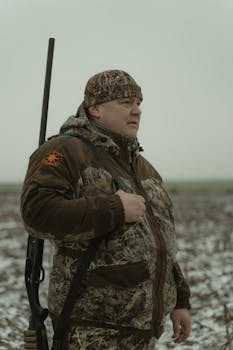The future of hunting communities in the United States is a dynamic topic, reflecting changes in technology, culture, and conservation efforts. As society evolves, so too do the values and practices surrounding hunting. This article discusses various facets influencing the future of these communities, providing a comprehensive analysis of emerging trends and challenges.
With an increasing focus on sustainability, hunters are becoming more aware of their ecological impact. This awareness leads to modified hunting habits, enhancing responsible practices. The future of these communities depends significantly on embracing conservation and the shared ethos among hunters.
Furthermore, technological advancements are reshaping the hunting landscape, introducing new tools and methods. From high-tech gear to social networking platforms, technology fosters stronger connections within communities. This evolution turns the hunting experience into something more intricate and engaging.
The Evolution of Hunting Practices
Hunting practices have transformed drastically over generations, moving from survival-based methods to recreation-driven activities. This shift has sparked a new wave of interest in ethical hunting strategies. Today’s hunters are increasingly conscious of conservation principles, aiming to balance their passion with ecological responsibility.
Moreover, the integration of local wildlife management practices has become common. Communities collaborate with wildlife agencies to ensure sustainable population control. Such partnerships play a critical role in preserving the natural environment while fostering responsible hunting.
As hunters implement modern techniques, education becomes vital. Workshops and seminars are now marginalized, focusing on ethical hunting, tracking, and safety practices. These educational endeavors give hunters the tools to navigate the evolving landscape effectively.
Additionally, traditional hunting methods are still valued, often interwoven with modern practices. Apprenticeship and mentorship between experienced hunters and novices foster a rich tradition of knowledge-sharing. This melding of old and new ensures a comprehensive understanding of hunting.
Ultimately, the evolution of hunting practices showcases how communities adapt to societal changes. The future relies on a commitment to learning, cooperation, and maintaining the integrity of hunting traditions.
The Role of Technology
Technological advancements have significantly influenced hunting communities across the United States. Gadgets range from GPS devices to apps that assist in locating game or tracking weather conditions. These innovations not only improve efficiency but also elevate the hunting experience.
Moreover, social media has reshaped how hunters interact and share knowledge. Online platforms enable hunters to exchange tips, experiences, and even organize group hunts. This connectivity fosters a sense of community, making hunting more accessible and enjoyable.
The rise of virtual reality (VR) also plays a role in attracting new hunters. VR simulations offer unique opportunities to practice skills without harming wildlife. Such experiences can inspire interest and promote safe hunting practices among youth.
Additionally, advancements in gear have changed the dynamics of hunting. Lightweight materials and enhanced optics allow for longer hunts with greater comfort. This technological evolution encourages hunters to explore more challenging terrains.
Thus, technology remains a double-edged sword, capable of enriching the hunting experience while demanding responsible use. Future hunting communities must navigate these advancements thoughtfully, ensuring balance and respect for nature.
Conservation and Sustainability
Conservation is a cornerstone of responsible hunting practices, shaping the values within hunting communities. As awareness of environmental issues rises, hunters are more focused on sustainable game management. This commitment benefits wildlife populations and habitats.
Collaborative efforts between hunters and conservation organizations have heightened conservation initiatives. Programs such as habitat restoration and species reintroduction exemplify these partnerships. They create a collective goal amongst hunters, emphasizing their role as stewards of nature.
Furthermore, educational initiatives focused on wildlife conservation engage both seasoned hunters and novices. Workshops promote responsible wildlife management, allowing communities to understand the broader implications of their choices. This shared knowledge fosters a culture of stewardship.
Government regulations play a vital role in conservation efforts too. Regulatory bodies set hunting seasons, limits, and zones to ensure wildlife sustainability. Adhering to these regulations underscores the ethical responsibility hunters have toward ecosystems.
In summary, conservation and sustainability remain primary focal points for future hunting communities. A commitment to these values fosters healthy ecosystems, ensuring hunting practices can continue long into the future.
Community-Building and Social Impact
Hunting communities often serve as more than just groups of individuals pursuing a shared hobby. They foster social connections and cultural traditions. Participating in hunting builds friendships that thrive beyond the field.
Additionally, community events bring hunters together, showcasing skills and celebrating culture. Game dinners, competitions, and local fairs foster camaraderie while passing down traditions to the next generation. This collective experience strengthens community bonds.
As urbanization grows, introducing hunting education programs in schools can spark interest amongst youth. By nurturing a sense of responsibility and appreciation for wildlife, communities can inspire the next generation of hunters.
Volunteer initiatives also contribute significantly to local ecosystems. Through community-led clean-up efforts and restoration projects, hunters can actively engage in improving their environment. This activity promotes a broader understanding of collaborative responsibility.
Overall, community-building not only enriches the hunting experience but establishes a foundation for future generations. It reinforces shared values and social responsibility within hunting culture.
Legal Aspects and Regulation Changes
The legal landscape surrounding hunting in the United States frequently evolves, reflecting societal values and conservation needs. Understanding laws and regulations is crucial for hunters as they navigate hunting seasons and permitted practices. Adjustments to these regulations can have significant implications for hunting communities.
Recent years have seen increased conversations surrounding hunting legislation, focusing on animal rights and ethical practices. Lobbying efforts by conservation and advocacy groups influence policy changes, promoting sustainable hunting practices. Hunters must stay informed to align with new regulations.
Furthermore, regulations often include new methodologies, such as using non-lead ammunition. This shift highlights a clearer commitment to reducing environmental impact. Engaging with these changes ensures hunters contribute positively to ecological health.
Education around hunting laws is vital, as ignorance can lead to unintended violations. Local organizations can help provide resources and pay attention to legal updates, fostering compliance among community members.
In summary, understanding legal and regulatory frameworks is essential for the continuity and integrity of hunting communities. Staying informed and compliant is part of being a responsible hunter.
The Importance of Mentorship and Education
Mentorship plays a crucial role in the sustainability of hunting communities. Experienced hunters impart knowledge to novices, ensuring the passage of skills and values. This relationship not only preserves traditions but also fosters a sense of responsibility within the community.
Formal education programs enhance the learning process by providing structured guidance. Workshops focused on ethics, safety, and conservation bridge knowledge gaps and unite hunters in shared learning experiences. Educational institutions can aid in cultivating interest among younger generations.
Furthermore, mentorship fosters a sense of accountability among hunters. A guided experience encourages individuals to respect wildlife and practice ethical hunting. This awareness contributes to a collective sense of stewardship over natural resources.
Additionally, mentorship can help address challenges faced by new hunters, such as gear selection or navigating public land. Support systems provide reassurance and foster a deeper connection to the hunting community.
Ultimately, investing in mentorship and education strengthens the foundations of hunting communities. It ensures that future generations remain committed to responsible and ethical practices, preserving this integral aspect of American culture.
Conclusion
The future of hunting communities in the United States is bright, marked by innovation, sustainability, and community engagement. By adapting to modern changes and maintaining traditions, hunters can navigate their evolving landscape effectively. Collaboration among hunters, conservation efforts, and technological advancements will ensure the continuity of hunting culture.
Education and mentorship are paramount in shaping responsible hunters, fostering enduring values in future generations. The commitment to ethical practices will benefit wildlife, ecosystems, and communities alike.
As we look toward the future, hunting communities must remain vigilant and adaptable. Resilience in the face of change will fortify their places within society while preserving the rich heritage of hunting traditions.


